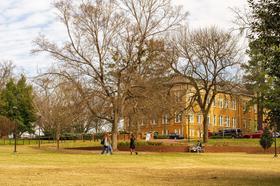The percentage of students achieving proficiency in math was 30-39% (which was lower than the Wisconsin state average of 77%). The percentage of students achieving proficiency in reading/language arts was 40-49% (which was lower than the Wisconsin state average of 82%).
School Overview
Grades Offered
Grades 6-8
Total Students (09-10)
53 students
Total Classroom Teachers
1 teacher
School Rankings
Math Test Scores (% Proficient)
(09-10)30-39%
77%
Reading/Language Arts Test Scores (% Proficient)
(09-10)40-49%
82%
Student-Teacher Ratio
n/a
13:1
American Indian
(09-10)n/a
2%
Asian
(09-10)n/a
4%
Hispanic
(09-10)2%
8%
Black
(09-10)96%
10%
White
(09-10)2%
76%
Hawaiian
(09-10)n/a
n/a
Two or more races
(09-10)n/a
n/a
Eligible for Free Lunch (09-10)
85%
30%
Eligible for Reduced Lunch (09-10)
2%
7%
School Statewide Testing
School District Name
Source: National Center for Education Statistics (NCES), WI Dept. of Education
Frequently Asked Questions
What percent of students have achieved state testing proficiency in math and reading?
30-39% of students have achieved math proficiency (compared to the 77% WI state average), while 40-49% of students have achieved reading proficiency (compared to the 82% WI state average).
How many students attend Silver Spring Neighborhood?
53 students attend Silver Spring Neighborhood.
What is the racial composition of the student body?
96% of Silver Spring Neighborhood students are Black, 2% of students are Hispanic, and 2% of students are White.
What grades does Silver Spring Neighborhood offer ?
Silver Spring Neighborhood offers enrollment in grades 6-8
What school district is Silver Spring Neighborhood part of?
Silver Spring Neighborhood is part of Milwaukee School District.
Recent Articles

Public School Transportation & Commute Planning Guide
Learn how public school transportation and commute planning can help families prepare for the coming school year safely and efficiently.

New Public School Safety Protocols 2025–26 Guide
Learn how new public school safety protocols for 2025–26 affect students, parents, and schools nationwide.

How Technology Transforms Education in 2025
Explore how technology shapes learning today, with updated data, policy context, trends, and real-world implications for students, educators, and families.





